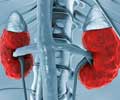US researchers have devised an eight-point risk factor checklist to predict chronic kidney disease.
US researchers have devised an eight-point risk factor checklist to predict chronic kidney disease. The checklist includes older age, anemia, female sex, hypertension, diabetes, peripheral vascular disease and any history of congestive heart failure or cardiovascular disease.
Traditionally, doctors have had no clear way to predict which of their patients might be headed down the road to chronic kidney disease (CKD). Now, researchers at NewYork-Presbyterian Hospital/Weill Cornell Medical Center and the University of North Carolina at Chapel Hill have created a simple eight-point risk factor checklist to do just that.As reported in a special double issue of the Archives of Internal Medicine, the model accurately stratifies middle-aged and older patients at high risk for newly diagnosed CKD, which involves a gradual, even fatal loss of kidney function over time.
According to the National Kidney Foundation, 26 million American adults have CKD and millions of others are at increased risk.
"These patients are often battling concurrent conditions such as diabetes or heart disease, so anything we can do to predict and then lower their risk for kidney disease will be invaluable," says study senior author Dr. Phyllis A. August, the Ralph A. Baer Professor of Medical Research at Weill Cornell Medical College, and an internist and nephrologist at NewYork-Presbyterian Hospital/Weill Cornell Medical Center.
In their research, Dr. August and colleagues combined data from two major studies, the Atherosclerosis Risk in Communities trial and the Cardiovascular Health Study, which together total 14,155 men and women aged 45 years or older. All of the participants had a glomerular filtration rate exceeding 60 mL/min/1.73m2 at the beginning of the study — indicating their kidneys were functioning at a normal healthy level at that time.
The researchers then tracked the health of the participants during a follow-up of up to nine years, recording those participants whose filtration rate fell below the healthy 60 mL/min/1.73 m2 threshold. They also tracked a wide variety of risk factors thought important to the onset of CKD.
Advertisement
"We discovered that a scoring system that included eight key risk factors — older age, anemia, female sex, hypertension, diabetes, peripheral vascular disease and any history of congestive heart failure or cardiovascular disease — accurately predicted which of the older patients would proceed to CKD and which would not," says study co-author Dr. Heejung Bang, assistant professor in the Division of Biostatistics and Epidemiology in the Department of Public Health at Weill Cornell Medical College.
Advertisement
Scoring a total of just three points in the model captured 70 percent of those patients who would go on to develop CKD over the next 10 years. For people scoring three, the model had 91 percent sensitivity for assessing how well the test identified people who would later go on to develop CKD, and a specificity of 28 percent for assessing how well the test identified those who would not develop the disease. For those scoring a six on the test, sensitivity and specificity were 93 percent and 25 percent, respectively.
"Importantly, we were able to validate the accuracy of the score across different cohorts, suggesting that it remains consistent in a variety of contexts," notes Dr. Abhijit V. Kshirsagar of the University of North Carolina Kidney Center, Chapel Hill, and the study's lead author. "Each of the eight components that make up the score is also easy to identify or quickly assess during any doctor-patient interview. Patients themselves can even self-assess using the tool, and bring their concerns to their doctor, if need be."
This means that physicians may now have valid jumping-off point for discussions of how patients can curb their odds for CKD, a condition that can lead to dialysis, end-stage kidney disease and even death. "Chronic kidney disease is largely preventable if its underlying root causes are caught early and treated," says Dr. Bang. "So it's important to know who's at risk. Our model helps answer that question."
The new algorithm may have an even broader impact. "As it becomes more clear as to just what conditions are the prime factors behind kidney dysfunction — factors such as diabetes, hypertension and heart disease — this tool should guide policymakers and researchers to find better and more cost-effective ways to target this devastating disease," notes Dr. August.
Co-authors include Dr. Andrew S. Bomback, Dr. Suma Vupputuri, Dr. David A. Shoham, Dr. Philip J. Klemmer of UNC Chapel Hill; and Drs. Lisa M. Kern and Madhu Mazumdar of NewYork-Presbyterian/Weill Cornell and Weill Cornell Medical College, respectively.
The study was supported by a Clinical and Translational Science Award to Drs. Bang and Mazumdar, and by the University of North Carolina Kidney Center.
Source-Medindia
GPL/L















